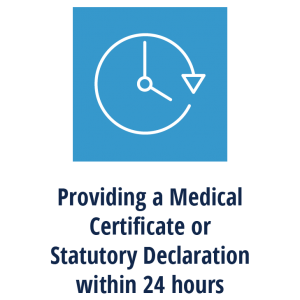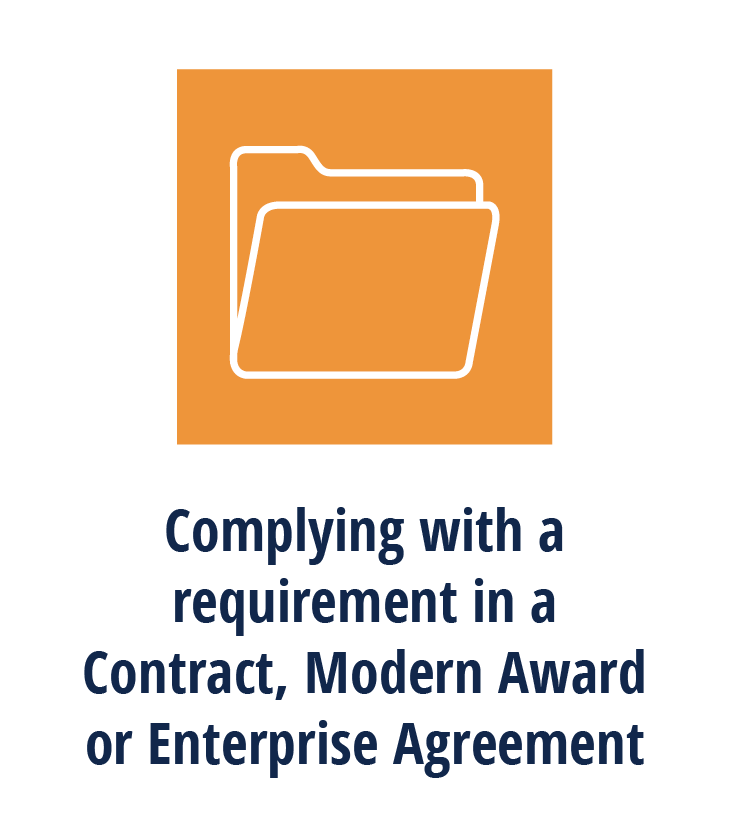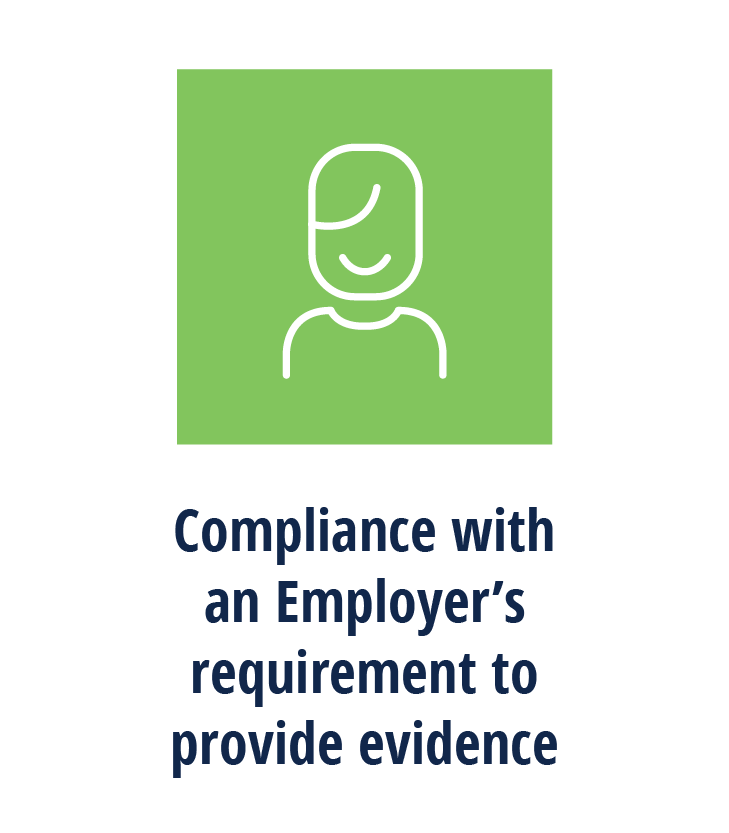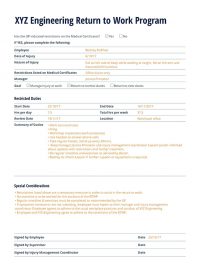Long-term work absences because of illness can be problematic for both businesses and employees, but some key management considerations can save unnecessary headaches.
Here, CCIWA Employee Relations Advice Centre (ERAC) senior employee relations adviser Eve Vasilas outlines what you need to know if you're managing a long-term absence as a result of injury or illness.
Unpaid sick leave
Employers are obligated to support and accommodate an unwell employee's safe return to work where it is reasonable.
Apart from paid 'sick days, and personal carer's leave', employees have a right to take longer periods of unpaid leave while they recover from illness or injury.
Provisions in s352 of the Fair Work Act 2009 outline that:
- An employer must not dismiss an employee because of a "temporary absence" from work due to an illness or injury.
- An employee will not be protected if the employee’s absence extends for more than three months, or the total absences of the employee, within 12 months, have totalled more than three months (whether based on a single illness or injury or separate illnesses or injuries).
- The employee is not on paid personal/carer’s leave for the entire duration of the absence.
A component of, but not all, of the leave must be unpaid: it can be as little as one day, but if all of the leave is paid leave the provisions of this clause can't be utilised.
While s352 only covers National System Employers, s772(1)(a) (under unlawful termination provisions) provides for the same protection and covers all employees, including those under a state system.
Employee obligations
The employee must be able to substantiate their illness or injury through one of the following methods, as per the Fair Work Regulations:

Certification
Employees should be able to provide a medical certificate for the illness or injury, or a statutory declaration about the illness or injury, within 24 hours after the start of the sick leave, or a longer period if that is reasonable in the circumstances.
These obligations are outlined in regulations 3.01(2)and 6.04(2) of the Fair Work Regulations 2009.

Notification
Employees must meet the requirements of their contract of employment, modern award, enterprise agreement, or other workplace instrument, by notifying the employer of their absence from work and/or substantiating the reason for the absence.
These obligations are outlined in 3.01(3) and 6.04(3) of the Fair Work Regulations 2009.

Evidence
An employee must comply with an employer’s requirement to provide evidence that would satisfy a reasonable person that their absence from work is because they're not fit for work due to personal illness or personal injury.
This requirement is outlined in 3.01(4) and 6.04(4) of the Fair Work Regulations 2009.
NOTE: The Fair Work Regulations 3.01(6) and 6.04(6) expressly state that an absence due to workers compensation does not count towards the three months.
.
Discrimination and dismissal
However, an employee cannot necessarily be dismissed as soon as he/she is no longer protected by the temporary absence provision.
Physical or mental impairment are prescribed discriminatory grounds under Fair Work Act and Equal Employment Opportunity legislation.
This includes mental health and illness and injuries.
Applicable legislation includes:
- Equal Employment Opportunity Act 1984 (WA)
- Australian Human Rights Commission Act 1986 (Cth)
- Disability Discrimination Act 1992 (Cth)
- Fair Work Act 2009 (Cth)
The Fair Work Act stipulates that an employer must not take adverse action against an employee because of an attribute of that person, which includes physical or mental disability, unless it is not unlawful under any anti-discrimination law.
However, it may be lawful if the adverse action relates to the inherent requirements of the particular position.
Adverse action can include many types of actions, including dismissing, injuring, altering, discriminating, refusing, ceasing, organising, or threatening.
Reducing the burden
Well-written policies and procedures may help reduce the length of absences.
Appropriate policy and procedure will ensure managers and employees are aware of what is expected of them as well as offering guidance on how to safely get the employee back into the workplace.
The policy should clearly state:
- the correct procedure for notification of absences;
- the evidence that you consider reasonable; and
- the circumstances in which you require such evidence.
Case law: McGarva v Enghouse Australia Pty Ltd [2014] FCCA 1522.
Under the case McGarva v Enghouse, an employee filed an adverse action claim against an employer following the termination of the employee who had been absent for 10 months due to cancer. The employer argued that the employee was prohibited from making an adverse action claim as the dismissal was not unlawful in accordance with s352.
The Federal Circuit Court found that just because the dismissal was authorised under s352, it did not prevent the employee from bringing an adverse action claim under s351:
An employer must not take adverse action against a person who is an employee, or prospective employee, of the employer because of the person's race, colour, sex, sexual preference, age, physical or mental disability, marital status, family or carer's responsibilities, pregnancy, religion, political opinion, national extraction or social origin.
The court stated that a dismissal that is authorised due to the period of absence may still be unlawful under anti-discrimination legislation.
The employee was granted permission to proceed with a discrimination-based adverse action claim under s351.
The Fair Work Act stipulates that:
- notice must be given to the employer as soon as practicable; and
- employees must advise the employer of the period, or expected period, of the absence.
For example, a business could stipulate that the employee should contact their direct supervisor at least two hours before commencing the shift (if possible), by telephone: clearly setting out who, when and how.
In terms of reasonable evidence, a medical certificate, a note signed by a pharmacist or a statutory declaration could all be reasonable in the circumstances.
Your policy can state what is considered reasonable. For example: a medical certificate where the absence is two or more days or either side of a public holiday.
Employees and supervisors should receive training on the policy and ensure the policy is consistently adhered to.
If the policy is not consistently adhered to, it can be difficult to take action where an employee does not follow the process outlined in the policy.
Mental health
Workplaces that promote mental health and support people with mental health problems are more likely to reduce absenteeism, increase productivity and benefit from associated economic gains.
A negative working environment can lead to both physical and mental health problems which can then lead to increased absenteeism.
Getting back to work
To ensure a successful return to work, there are a number of things you can do:
Keep in contact with the employee.
You should keep the lines of communication open with the employee, mainly for the purpose of:
- discussing medical certificates and reports received from the employee;
- discussing a potential return date;
- developing a return to work plan (if this is applicable); and
- determining if any reasonable adjustments may be necessary.
Always ensure the employee provides reasonable evidence of the absence as stipulated in the policies and procedures, Enterprise Agreement or Contract of Employment.

What's in a return-to-work plan?
CCIWA’s experts outline key considerations in building a return-to-work plan and share an editable plan template including a hypothetical case study.
Obtain further medical information
Where the absence spans over a long time, it may be appropriate to determine whether the employee will be able to perform the inherent requirements of the role in the foreseeable future without posing unjustifiable hardship on the employer.
There may be an ability to request additional information from the employees treating doctor (with the employee’s authorisation), or an independent medical examination, where such a request is lawful and reasonable.
For advice on this issue, contact CCIWA's Employee Relations Advice Centre on (08) 9365 7660 or email [email protected].







